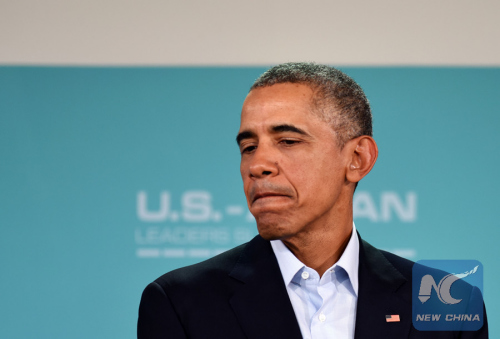
U.S. President Barack Obama speaks at at a press conference after the U.S.-ASEAN Summit in Rancho Mirage, California, the United States, Feb. 16, 2016. (Photo: Xinhua/Yin Bogu)
The United States and the Association of Southeast Asian Nations (ASEAN) on Tuesday issued a joint statement following a special leaders summit in California, outlining key principles that they say will guide their cooperation.
According to the statement, the U.S. and ASEAN say they recognize "the importance of pursuing shared prosperity; sustainable, inclusive economic growth and development; and respect and support for ASEAN centrality and ASEAN-led mechanisms in the evolving architecture of the Asia-Pacific."
In order for Southeast Asia to continue to thrive, it is in the interests of all regional countries to pursue shared prosperity. To achieve this, it is essential that countries from both inside and outside the region show respect for ASEAN centrality.
However, reports from the special leaders summit in California show otherwise, with President Barack Obama trying to impose his agenda of a U.S. pivot to Asia. Speaking at a press conference after the meeting, the U.S. president tried to hype up the differences among regional countries including China. But China and the South China Sea were not mentioned in the joint statement, a clear indication that ASEAN refused to allow the meeting to be hijacked by the U.S.
ASEAN has long been known for its consensus-based approach to conflict. Over time, such an approach has yielded impressive results and economic growth.
ASEAN centrality is crucial for broader regional cooperation to succeed because it ensures that its shared platform of cooperation will not be manipulated by any one country outside or inside the region, say experts.
Such a principle is in the interests of all countries in the Asia-Pacific as it is conducive to the pursuit of shared prosperity and growth. It also means that any one country cannot force its own agenda on ASEAN.
On the issue of maritime security in particular, ASEAN does not share the views of the U.S. on how to handle disputes.
Singapore Prime Minister Lee Hsien Loong stressed that the issues "must be managed peacefully to preserve regional stability and security." Thai Prime Minister Prayut Chan-o-cha said he believed the Declaration on the Conduct of Parties in the South China Sea (DOC) is a useful mechanism to gain trust among the concerned parties and bring about peaceful solutions to disputes.
The U.S. has been diverting military resources to the Asia-Pacific and seeking controversial trade agreements to solidify its pivot to Asia. It has also been galvanizing countries in the region by offering them some assistance.
Such moves, using the pretext of the freedom of navigation, have only fanned the flames of tension in Asia. More importantly, the U.S. has not shown due respect for ASEAN's cherished principle of centrality, and its approach runs the risk of dividing the group and jeopardizing regional cooperation.
Luckily, ASEAN has not allowed itself to be hijacked. The bloc has long learned that it is important to try and manage differences and seek common ground. Doing so is the only way to prosper and move forward.


















































